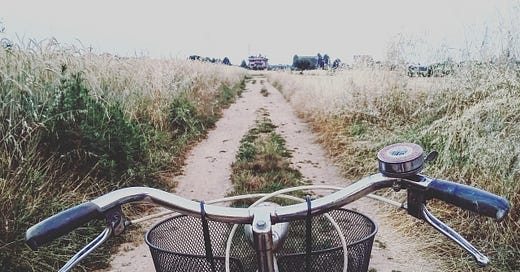I bought my first—and probably only—house this past February. It’s a small 1940s Cape Cod in a rural town of 780 people in central Wisconsin, less than an hour from where I grew up.
I’ve spent the 20 or so years since I graduated from high school trying to get away from this place. At 18, I immediately moved from my hometown to the nearest thing resembling a city: a 75,000-person industrial suburb-esque town with a sprawling shopping mall that offered Olive Garden, TJ Maxx and Barnes & Noble as stand-ins for luxury. Ready for college a few years later, I moved to our state’s capital city, Madison, to attend our most prestigious public university and surround myself with coffee shops, rich people in suits, public transportation, walkable streets and pride flags. When I dropped out of college a few years after that, I made the leap to San Francisco—the second most-densely populated and fastest-growing metro area in the country. And one with plenty of rich people and pride flags to go around.
I didn’t explicitly imagine myself as a city girl while I was growing up in a small town. But a healthy diet of rom-coms featuring New York-based heroines living my best writer’s life must have made its mark. I quickly embraced the identity as I made my way up the ladder from conservative mill town to West Coast liberal enclave.
I sat full days behind my Macbook in quirky coffee shops. I read novels on the BART. I attended open mic nights and small-time book signings. I discovered Pad Thai, banh mi and Mission burritos, all for under $5 a meal. I wore black ballet flats actually called “city flats” because I imagined them to be perfectly suited for the life I was meant to live. I marched in D.C. against the war in Iraq, in Madison against Act 10, in San Francisco against Wall Street and in Tampa Bay against Trump. I worked for creative startups. I paid rent by selling clothes on consignment and walking a dog for a rich lady recovering from chemotherapy. I was living the life.
Between 2011 and 2015, my partner and I traveled around small towns and big cities in the U.S., never settling in one spot for more than a few months and always making our way to some city—San Francisco, Seattle, Salt Lake City. A job took me to St. Petersburg, Florida, in 2015, and we finally settled in for a few years.
Except for Florida’s car culture, St. Pete was city enough—some walkability, a few restaurants and, if not actual diversity, at least more proximity to Black and Latinx people than I experienced in the Midwest. But the density and aggression of the rapidly growing Tampa Bay area wore on me, and I began to appreciate my trips home to Wisconsin for more than the free place to crash they’d been in my nomadic years.
About 15 years and 1,500 miles away from my hometown, I began to identify as a Wisconsinite for the first time in my life.
The distance I’d put between myself and my hometown in that time only worked to unearth my Wisconsin roots. I hated every other state’s attempts at fried fish. I couldn’t believe the price of beer. I could never find French salad dressing. I never could stop myself from calling a water fountain a “bubbler.”
My partner and I made our way back to Madison just before our world locked down in 2020. We were delighted to be back in our little liberal enclave… until the world began to open up again. The city had been so quiet during our first year there, when no one had to drive to work in an office and most people were hesitant to leave home at all. It was all peaceful strolls down walkable streets, bike rides on spacious paths and contactless delivery of any kind of food we craved.
As our local COVID-19 restrictions eased, the city got busy. And loud. Heavy trucks and souped-up cars rumbled and roared down our busy street. People (and their nosy dogs) gave less berth walking through the neighborhood. Food deliveries arrived late and cold. Our beloved organic-grocery coop was crowded by inconsiderate yuppies with giant carts blocking every aisle. Anywhere interesting was overrun with tourists making up for lost time. And: traffic.
Plus, now my partner and I were in our mid-30s instead of our mid-20s. Sharing walls with strangers—and their Dolby Surround Sound systems—becomes much less tolerable when you go to bed sober by 10 p.m. every night.
But we’re millennials earning average money, so comfort, privacy and autonomy aren’t affordable to us in the city.
We’d been kicking around an idea to buy something up north in central Wisconsin, where my family still lived, for years. In late 2022, we started semi-seriously browsing Zillow listings and visiting houses to get an idea of what we could afford and whether we could imagine ourselves in it.
We weren’t ever going to move here for real.
Originally, we were looking for something small, like a weekend cabin, where we could hang out when we wanted to get away from the city. It would make it easy to spend more time near my family and give me a lovely retreat for writing. Then we found the place we ended up buying: an 800-square-foot house in one of the county’s larger villages (right downtown!), just down the road from my niblings’ school and three miles from my sister’s house. This wasn’t a retreat. This was where I wanted to be all the time.
When we put in the offer—$125,000, to point out an enormous benefit of small-town living—we planned to make this new house our full-time residence and rent a small place in Madison for regular retreats to the city. We could do both within the amount we’d been spending on rent in the city.
And then, at one point, we just decided not to do that. One-bedroom rentals had become scarce in the city, and we realized how nice it’d be to have the extra cash each month… and, sheepishly, that we weren’t using the amenities of the city anymore, anyway.
We’d been paying downtown rents, but we weren’t engaged in the city’s nightlife, our closest friends were scattered around the country, we worked from home and we ate at the same two or three restaurants most weekends. We appreciated bike lanes and sidewalks, but we can walk to restaurants, a library and a general store in our new tiny town. Plus, the barely used county roads make for hundreds of miles of beautiful bike rides—where we don’t have to dodge pedestrians, dogs or strollers.
The hardest thing to give up about living in the city was the idea of living in the city.
I’d made the city—not any particular one, just “city”—part of my identity. I might have been raised in a small town, but I was liberal and risky and queer and embraced diversity and rejected cars and loved Thai food. I was someone who couldn’t be contained within the bounds of a small town. I wrote blog posts from the subway!
But I have the internet, I work from home, I’m done dating, and it’s been almost a decade since I’ve drunk alcohol or caffeine. Our county has a small-but-mighty Democratic party in need of volunteers under the age of 60, and I can hang a pride flag on this house that I own. The city is just a couple hours’ drive away whenever I’m craving Pad See Ew.
My new yard has a tree so big it must be more than 100 years old, and my kitchen table holds a vase of rogue daisies that popped up nearby last week. We planted native wildflowers to replace the grass. We made a compost pile that doesn’t have to be shipped away somewhere. There’s room for a vegetable garden next year, and now we’re talking about chickens.
And this small town has something I could never take with me to the city: that feeling of being home.
In spite of all the ways I’m different from this place and all the things the world outside had to teach me about myself, my roots are in central Wisconsin. I like my fish breaded, not battered. I like my family coming into the house without knocking. I like my stupid accent. I like watching a Disney movie with my nieces on a Saturday night. I like cottage cheese on the side of my meal. I like that my neighbors know my name.
I know not everyone feels this way in their hometowns. I know a lot of these close-knit, rural, conservative, Christian outposts are riddled with trauma for people like me and are downright unsafe for many others. That’s tragic because these are no less their roots. I’m aware of the privilege that lets me walk safely through this town and reap the beauty of feeling at home in the place that made me who I am.
And that makes it feel important that I’m here, now. I didn’t retire to this town; I have a lot of life left to live and work left to do while I’m here. I know 67% of voters in this county voted for Donald Trump in 2020 and the Republicans who now represent me in our state government voted to ban critical race theory and trans health care when given the chance. And I’ll work with county Dems to make sure Biden takes Wisconsin in 2024 and that a Democratic governor remains a check on our legislature. I’m not an outsider. I’m of this place, and I won’t let political extremism ruin what’s good about it and run off all the interesting people.
It was difficult to shed the part of me that needed to identify with the city, because I thought that was the part that held onto these ideals. I was afraid returning to the small town would mean quieting all the parts of myself I’ve discovered since I left.
But I’ve found those parts of me even more energized since I moved here. Life feels richer outside of the echo chambers of the city. There aren’t enough people in the small town for us to insulate among people we agree with. Conversations are more interesting when each person has something to learn from the other. Planned Parenthood signs and pride flags are beacons of safety, not virtue signals.
I still get annoyed when everything is closed on Sundays and there’s literally one restaurant that delivers in the entire county and no grocery store within 25 miles stocks fair-trade bananas. But I can skip bananas.
Living in cities used to feel like the only way I could be who I truly am. Coming home has helped me see the power of being who I am wherever I live.





